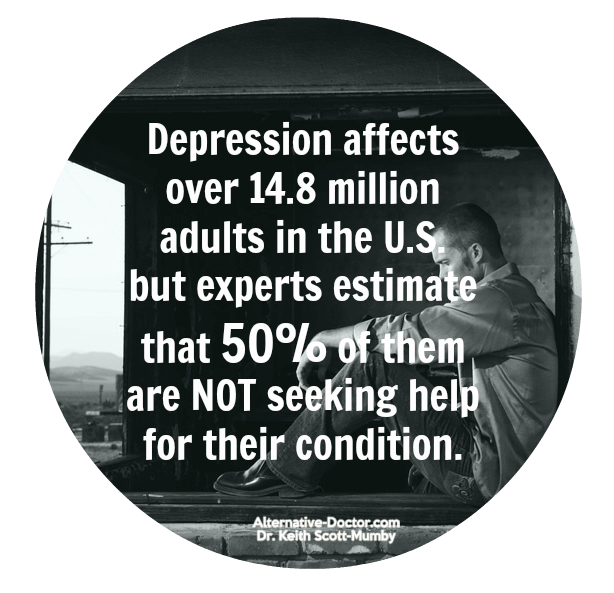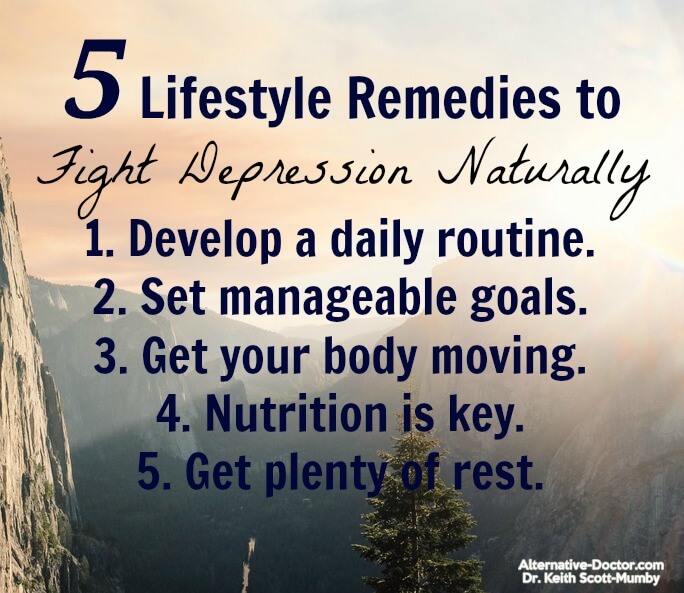If you’re suffering from anxiety, stress, depression, bipolar disorder, obsessive-compulsive disorder, or any other psychological condition – you are not alone.
Depression is the #1 cause of medical disability in the United States.
The news media likes to refer to depression and other mood disorders as an “epidemic.” It isn’t simply that more people are suddenly depressed. It’s primarily that more people are coming forward for help and receiving a prescription.
Depression and other mental struggles aren’t new. The mainstream “answer” to them is new.
The Lucrative Business of Depression
The pharmaceutical companies promise a pill to fix anything (including depression) in their commercial ads. As a result, they make billions from the disease and have very little motivation to help find a lasting solution.
Rather than putting money into medical research to figure out the cause of mental illness, the focus remains on the development of new antidepressants and other drugs to treat the symptoms.
There are many ways to fight depression naturally and effectively. Even if you’re currently taking medication, there are techniques that can improve their effectiveness.
The two things I want you to remember is that there is nothing wrong with asking for help and there is nothing wrong with taking the help you need to feel better.
Depression Facts
 Mental illness has been in the news a lot lately. Major depressive disorder (MDD) affects more than 14.8 million adults in the U.S. but experts estimate that 50% of those with depression are not seeking help for their condition.
Mental illness has been in the news a lot lately. Major depressive disorder (MDD) affects more than 14.8 million adults in the U.S. but experts estimate that 50% of those with depression are not seeking help for their condition.
There is no doubt in anyone’s mind that it’s the stigma surrounding depression that keeps people from discussing their personal situation. The way it is further stigmatized in the press by politicians, corporations, or educators who make it an unfortunate scapegoat worsens many long-standing misconceptions and outright lies about mental illness.
Everyone has bad things happen to them or experiences a negative period of time. It isn’t uncommon to use the expression “I’m depressed.” It even happens to people who are perpetually optimistic. Feeling down is nothing for which you need to feel ashamed.
In most cases, it’s a response to a particular situation, loss, or stressor that isn’t part of your normal daily life. Usually, we can naturally fight depression symptoms before they settle in and become an ongoing problem.
Actual depression is a clinical condition that is more protracted and severe than everyday feelings of “the blues.” It may last for long periods of time, accompanied by feelings of intense sadness, loss of interest, or worthlessness. Your perception of yourself and the world around you can become unclear, making you susceptible to greater feelings of despair.
Most Commonly Reported Symptoms for Clinical Depression:
- Experiencing a “down” mood for the majority of each day. Those with clinical depression report that mornings are often the most difficult time for them.
- Tiredness or fatigue that doesn’t go away no matter how much sleep you get.
- Inability to concentrate, remember information, or make firm decisions.
- Lack of interest in activities that once brought you pleasure.
- Dwelling on thoughts of death or taking your life.
- Unexplained weight loss or lack of appetite.
- Unexplained weight gain or sudden increase in food cravings.
- Sleeping too much (known as hypersomnia) or too little (insomnia).
- Feeling trapped, restless, or suffocated by the circumstances in your life.
- Physical, verbal, and mental “slowing down” which manifests in slower speech and body movements.
- Intense feelings of sadness, guilt, worthlessness, or unhappiness about your life.
- Sudden focus on past events and perceived failures.
- Frustration, anger, and general irritability over trivial matters.
- Loss of sex drive.
- Constant fidgeting or nervousness, which can be the result of intense worry or anxiety.
- Pain with seemingly unknown causes or chronic pain that never seems to ease.
Depression is not a choice. It can bleed into every single area of your life, changing core aspects of your personality and altering your typical behavior.
A depressed patient’s deep gloom and sense of helplessness can be so crippling that he or she may consider the possibility of causing physical pain to their body or even ending their life.
Suicide is the 10th most common cause of death for adults and the third most common cause of death for young people.
Depression will affect the lives of at least 5% of American adults this year. That number is considered ultra-conservative since many suffering from depression are never diagnosed.
These appalling figures tell us all too clearly that conventional treatment for depression has a long way to go. It’s time to fight depression naturally as well. To look beyond pharmaceutical tweaking of brain chemicals and consider what natural remedies have to offer.
Simply mixing concoctions is doing the majority of those suffering from depression a disservice. Especially since 20% of patients diagnosed with depression do not respond to antidepressant medications.
Left untreated, depression can lead to time missed from work, damage to interpersonal relationships, disability, and suicide. It has also been shown to physically worsen chronic illness in measurable degrees.

Diseases Negatively Impacted by Depression:
- Asthma
- Diabetes
- Cancer
- Arthritis
- Cardiovascular disease
- Obesity
There is a bigger picture and a large part of that are the physical causes of depression. Not the answer to every case but – when identified and corrected – can lead to a full and satisfying recovery. Depression is a complex and multi-factorial problem and not merely a neurotransmitter shortage that can be solved with a prescription.
5 Lifestyle Remedies to Fight Depression Naturally
1. Develop a routine you follow daily. Routines help you feel more in control – the opposite of the out-of-control feelings that depression inspires.
Start small and gradually work your priorities and regular habits back into your daily life. You’ll feel stronger and more in command of your recovery. Take on responsibilities as you feel better to immerse yourself into your life again.
2. Set goals that are manageable. One of the common themes of depression is inadequacy and sense of being a failure. By breaking large goals into smaller, bite-sized pieces, you will feel the joy of accomplishing them and gradually return to the confidence and self-worth you deserve. As time passes, add slightly larger goals to strengthen your newfound sense of accomplishment.
3. Get your body moving. There are exercises for every age and state of physical health – you don’t have to run a marathon or bike one hundred miles. When you exercise, your body releases chemicals called endorphins that are commonly known as “feel good” hormones. Going for a walk, stretching, or dancing in your living room are great places to start.
For added enjoyment – try something new! Maybe your local community center has belly dancing classes or they have groups that meet to play basketball.
4. Nutrition is key to many health issues. Depression is no different. Your body requires certain fuel to function properly. If you fill up your “engine” with over-processed and chemical-laden foods – it has a similar effect as putting sugar in your car’s gas tank.
Add the following mood-booster choices to your nutrition plan for an added dose of food medicine that eases depression symptoms without the side effects!
- Fatty fish (wild salmon, tuna, sardines, and anchovies)
- Coconut oil
- Oatmeal
- Berries (all of them!)
- Nuts and seeds (cashews, walnuts, and almonds specifically)
- Garlic
- Leafy greens
- Citrus (pick your favorite!)
- Asparagus
- Oysters
- Chamomile and green tea
- Avocado
- Dark chocolate (the higher the cacao ratio, the better)
- Lean organic proteins (beef and poultry)
5. Get plenty of rest. In the United States, approximately 70% of the population is considered sleep-deprived – that includes men, women, and children. It is no wonder our productivity is dropping as our health is declining.
Sleep is the time when your body heals itself. As you rest, cells are repaired and new ones are produced. Your system cannot function without adequate sleep. Lack of sleep has been shown to significantly worsen the effects of depression.
Start slow and make an effort to consistently go to bed at the same time every night and wake up at the same time every morning. Try not to nap. Avoid “stimulating” your sleep time with television or music.
Fighting depression naturally – even in conjunction with medication – will only help things improve that much faster. There are often painful emotional components as well that you can’t ignore for your own sake. The most important thing to remember is that you can feel better.
Ask for help! Accept help! You are not alone!
